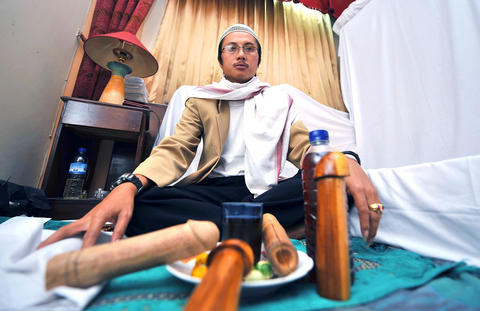Three large wooden penises lie on a colorful batik prayer mat in the house of Mak Erot, Indonesia's legendary lengthener of male members, inviting customers to pick their new look.
Mak Erot, the undisputed national expert in solving the self-image problems of Indonesian men, seems to have disappeared a long time ago but many believe she is still working her magic, perhaps from beyond the grave.
The craggy, betel nut-chewing woman with a distinctive brown birthmark on her cheek has spawned legions of imitators, while her legitimate heirs are keen to keep up the facade that she's alive lest business die with her.

PHOTO :AP
And it is a booming business - as a glance at the classified pages of any Indonesian tabloid newspaper will attest, packed as they are with ads for "penile paranormals" all claiming to have been trained by Mak Erot.
Jakarta, the nation's capital, even has a Mak Erot "clinic."
She has made it into popular culture too, with the film Extra Large: Between Me, You and Mak Erot currently playing in cinemas.
Mak Erot's village of Caringin is at the end of a road that winds along the Indian Ocean coast in southwestern Java. Her white house sits in a region where farmers from Indonesia's Sundanese culture incorporate their ancient animistic beliefs with Islam.
As expected, the disciples at Mak Erot's house say she's still alive.
"Mak Erot went to open an office in Medan (North Sumatra)," says a young man wearing a traditional Muslim beanie. "She's in a good shape. She still can walk."
He introduces himself as Haji Baban, Mak Erot's grandson, an heir of the old woman's esoteric powers and expertise in rare plants.
"People from all over the world come here, from Arab countries, from China, Singapore, Korea, Malaysia, Taiwan," he says.
"They want solutions to impotence or premature ejaculation, they ask to have a longer penis."
According to the daily Kompas, Mak Erot passed on her "science" to her five children and sixteen grandchildren who account for her 21 true heirs, a select order of masters of male enhancement.
A consultation with Haji Baban is an encounter with the arcane. Sitting cross-legged in semi-darkness, the patient is asked to detail his wishes with the visual aid of a selection of carved wooden phalluses.
Then comes the diagnosis, delivered after a contemplative silence.
Solemnly, Haji Baban intones that the client's appendage is "fairly average," and offers to conjure up a 6cm extension.
The prescription for such whopping growth is a 10-day course of eating and drinking mystery concoctions and secret potions, with the first dose of bitter berries to be taken immediately, washed down with dark brown liquid.
An assistant then brings a phallus shaped bamboo tube containing a roll of sticky coconut rice that has to be swallowed whole to avoid what Haji Baban describes ominously as "terrible genital consequences."
Haji Baban ends the consultation with a vegetable oil that the client must promise to apply daily with a specific hand action from base to tip. And no eating green bananas or citronella, he orders.
The daily cost for treatment is between US$70 and US$100, depending on the options selected.
This is a hefty sum for many in Indonesia but the imposing mansions being built around Caringin seem to indicate that plenty of men are willing to pay.
A local motorcycle taxi driver gestures to the newly built homes and says: "They belong to Mak Erot."

Taiwan has next to no political engagement in Myanmar, either with the ruling military junta nor the dozens of armed groups who’ve in the last five years taken over around two-thirds of the nation’s territory in a sprawling, patchwork civil war. But early last month, the leader of one relatively minor Burmese revolutionary faction, General Nerdah Bomya, who is also an alleged war criminal, made a low key visit to Taipei, where he met with a member of President William Lai’s (賴清德) staff, a retired Taiwanese military official and several academics. “I feel like Taiwan is a good example of

March 2 to March 8 Gunfire rang out along the shore of the frontline island of Lieyu (烈嶼) on a foggy afternoon on March 7, 1987. By the time it was over, about 20 unarmed Vietnamese refugees — men, women, elderly and children — were dead. They were hastily buried, followed by decades of silence. Months later, opposition politicians and journalists tried to uncover what had happened, but conflicting accounts only deepened the confusion. One version suggested that government troops had mistakenly killed their own operatives attempting to return home from Vietnam. The military maintained that the

Jacques Poissant’s suffering stopped the day he asked his daughter if it would be “cowardly to ask to be helped to die.” The retired Canadian insurance adviser was 93, and “was wasting away” after a long battle with prostate cancer. “He no longer had any zest for life,” Josee Poissant said. Last year her mother made the same choice at 96 when she realized she would not be getting out of hospital. She died surrounded by her children and their partners listening to the music she loved. “She was at peace. She sang until she went to sleep.” Josee Poissant remembers it as a beautiful

Before the last section of the round-the-island railway was electrified, one old blue train still chugged back and forth between Pingtung County’s Fangliao (枋寮) and Taitung (台東) stations once a day. It was so slow, was so hot (it had no air conditioning) and covered such a short distance, that the low fare still failed to attract many riders. This relic of the past was finally retired when the South Link Line was fully electrified on Dec. 23, 2020. A wave of nostalgia surrounded the termination of the Ordinary Train service, as these train carriages had been in use for decades